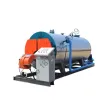Is it worth buying a new gas boiler?
Deciding whether to buy a new gas boiler involves considering several factors related to the efficiency, condition, and overall cost-effectiveness of your current boiler. Here are key considerations to help you determine if investing in a new gas boiler is worth it:
1. Age of the Current Boiler:
The age of your existing gas boiler is a crucial factor. Older boilers tend to be less energy-efficient and may have outdated technology. If your boiler is more than 10-15 years old, it might be worth considering a replacement for improved efficiency and performance.
2. Energy Efficiency:
Newer gas boilers are designed to be more energy-efficient, leading to cost savings on energy bills over time. If your current boiler has a low energy efficiency rating, upgrading to a newer model can result in reduced fuel consumption and lower heating costs.
3. Repair Frequency and Costs:
Evaluate how often your current boiler requires repairs and the associated costs. If you find yourself frequently dealing with breakdowns and facing substantial repair bills, it may be more cost-effective in the long run to invest in a new, reliable boiler.
4. Energy Bills:
Compare your current energy bills with the potential savings offered by a new, more efficient gas boiler. Modern boilers often feature advanced technologies, such as condensing technology, which can significantly improve energy efficiency and reduce heating costs.
5. Environmental Impact:
Newer gas boilers are designed to be more environmentally friendly, producing fewer emissions. If reducing your carbon footprint is a priority, upgrading to a high-efficiency boiler can contribute to environmental sustainability.

6. Government Incentives:
Check for any available government incentives or rebate programs that encourage the installation of energy-efficient heating systems. In some regions, financial incentives may make the purchase of a new gas boiler more economically attractive.
7. Home Heating Needs:
Consider your current and future home heating needs. If your existing boiler meets your heating requirements and upgrading is not essential, you might delay the investment. However, if you plan home renovations or expansions, a more powerful and efficient boiler may be necessary.
8. Overall Heating System Performance:
Assess the overall performance of your heating system, including the compatibility of your current boiler with other components like radiators and controls. Upgrading the entire system may improve overall efficiency and performance.
9. Long-Term Investment:
Investing in a new gas boiler is a long-term decision. Consider the upfront cost versus the potential savings over the lifespan of the new boiler. A more efficient and reliable boiler can offer a return on investment through reduced energy bills and maintenance costs.
10. Professional Assessment: - Consult with a qualified heating professional to assess the condition of your current boiler and provide expert advice on whether replacement is recommended. A professional assessment can help you make an informed decision based on your specific circumstances.
In conclusion, the decision to buy a new gas boiler depends on various factors, including the age and efficiency of your current boiler, energy bills, repair costs, and long-term savings. Conduct a thorough evaluation, consider your heating needs, and weigh the potential benefits of upgrading to a more efficient and reliable gas boiler.
296
0
0

Comments
All Comments (0)